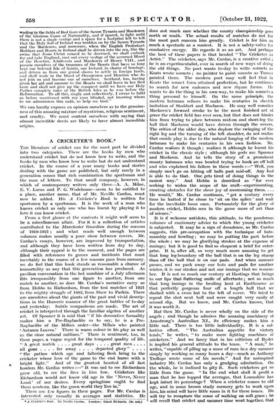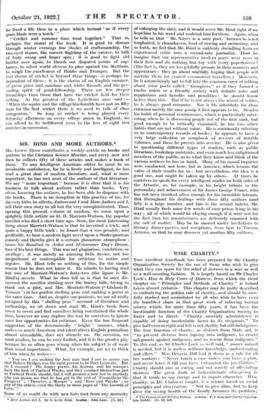A CRICKETER'S BOOK.*
Tim literature of cricket can for the most part be divided into two categories. There are the books by men who understand cricket but do not know how to write, and the books by men who know how to write but do not understand cricket. In the course of a year many books and stories dealing with the game are published, but only rarely in a generation comes that rich combination the sportsman and the man of letters. To that small company, however, in which of contemporary writers only three—A. A. Milne, E. V. Lucas and P. G. Wodehouse—seem to be entitled to a place, another name, that of Mr. Neville Cardus, must now be added. His A Cricketers Book is written for sportsmen by a sportsman. It is the work of a man who knows cricket as only one who has learnt by playing it to love it can know cricket.
From a first glance at the contents it might well seem to be a miscellaneous affair. For it is a collection of articles contributed to the Manchester Guardian during the seasons of 1919-1921 ; and what reads well enough between columns makes usually a poor show between covers. Mr. Cardus's essays, however, are improved by transportation, and although they have been written from day to day, although their appeal is to the moment, and the pages are filled with references to games and incidents that must inevitably in the course of a few seasons pass from memory. we do feel that this book stands as reasonable a chance of immortality as any that this generation has produced. As pavilion conversation in the hot sunshine of a July afternoon flits irresponsibly from one figure to another, from one match to another, so does Mr. Cardus's narrative carry us from Hobbs to Richardson, from the test matches of 1921 to the mighty struggle of 1882, from Shaw to Parkin. There are anecdotes about the giants of the past and vivid descrip- tions in the Homeric manner of the great battles of to-day and yesterday. Subtle comparisons are made. The art of cricket is interpreted through the familiar algebra of another art. Of Spooner it is said that " if his decorative formality makes him a Pre-Raphaelite so to say, he is a Pre- Raphaelite of the Millais order—the Millais who painted Autumn Leaves.' There is warm colour in his play as well as the clear natural outlines." There is sentiment, too, in these pages, a vague regret for the temporal quality of life. " A great match . . . . great days . . . . great men . . . . all gone . . . . far away . . . . departed glory " . . . . " the pathos which age and faltering flesh bring to the cricketer whose love of the game to the end burns with a bright light." And of the greatest hearted of all fast bowlers Mr. Cardus writes :—" It was sad to see Richardson grow old, to see the fires in him low. Cricketers like Richardson would not know old •age in the Never, Never Land' of our desires. Every springtime ought to find them newborn, like the green world they live in."
There are fray figures in these pages. For Mr. Cardus is interested only casually in averages and statistics. He • A Cricketer's Book. By Neville Cardin. London.: -Grant Richards. las. seta does not much care whether the county championship goes north or south. The actual results of matches do not for the most part concern him greatly. Cricket is for him as much a spectacle as a contest. It is not a safety-valve for combative energy. He regards it as an art. And perhaps the best of these papers is that headed " The Cricketer as Artist." The cricketer, says Mr. Cardus, is a creative artist ; he is an experimentalist, ever in search of new ways of doing the old things. No poet wants to-day to write sonnets as Keats wrote sonnets ; no painter to paint sunsets as Turner painted them. The modern poet may well feel that in Keats the sonnet form attained perfection, but he continues to search for new cadences and new rhyme forms. He wants to do the thing in his own way, to make his sonnets a thing personal to himself. On the same principle, the modern batsman refuses to make his centuries in slavish imitation of Stoddart and Maclaren. He may well consider Maclaren's forward stroke to be the most finished act of grace the cricket field has ever seen, but that does not hinder him from trying to place between mid-on and short-leg the ball that Maclaren would have driven through the covers. The critics of the older day, who deplore the swinging of the right leg and the turning of the left shoulder, do not realize that onside play is due to the natural longing of the modern batsman to make his centuries in his own fashion. Mr. Cardus realizes it though ; realizes it although he learnt his cricket in the classic style ; although his gods are Spooner and Maclaren. And he tells the story of a prominent county batsman who was bowled trying to hook an off ball and who explained his failure in these words :—" Well, you simply can't go on hitting off balls past mid-off. Any fool is able to do that. One gets tired of doing things in the easiest way." And Hobbs is described as "for ever seeking to widen the scope of his craft—experimenting, creating obstacles for the sheer joy of overcoming them... He would," Mr. Cardus continues, " get a century every time he batted if he chose to ' sit on the splice ' and wait for the inevitable loose ones. Fortunately for the glory of modern cricket, Hobbs sees in the game more of art than of science."
It is if welcome antidote, this attitude, to the ponderous volumes of cautionary advice to which the young cricketer is subjected. It may be a sign of decadence, as Mr. Cardus suggests, this pm-occupation with the technique of bats- manship and bowling ; we may be putting the part before the whole ; we may be glorifying strokes at the expense of innings; but it is good to find so eloquent a brief for enter- prise. It is, after all, so very much more amusing to get that long leg boundary off the ball that is on the leg stump than off the ball that is on our pads. And when summer passes, and we pack away our bats and pads for another winter, it is our strokes and not our innings that we remem- ber. It is not so much our century at Hastings that brings to our lips that fluttering smile of aftertaste ; not so much that long innings in the broiling heat at Eastbourne as that perfectly gorgeous four off a length ball that we slashed with a cross bat to the left of cover. We tried to repeat the shot next ball and were caught very easily at second slip. But we know, and Mr. Cardus knows, that it was worth it.
But then Mr. Cardus is never wholly on the side of the angels ; and though he admires the amazing machinery of Armstrong's Australian XI., its efficiency makes him a little sad. There is too little individuality. It is a col- lective effort. " The Australian appetite for victory tends," he writes, " to make mere fighting machines of cricketers." And we fancy that in his criticism of Ryder is implied his general attitude to the team. " A man," he writes, "capable of piling up a mass of runs in a dry summer simply by working so many hours a day—much as Anthony Trollope wrote some of his novels." And for uninspired industry Mr. Cardus has only a grudging admiration. On the whole, lie is inclined to pity it. Such cricketers get so little from the game. " In the .end what shall it profit a man that he has topped the averages, that Loamshire has kept intact its percentage ? When a cricketer comes to old age, and in some -brown study memory gets to work upon him, his mind will have little room in it for these issues. He will try to recapture the sense of walking on soft grass ; he will recall that cricket and summer time went together. that he lived a life then in a place which burned ' as if every grass blade were a torch.' "
" Cricket and summer time went together." That is, perhaps, the moral of the book. It is good to discuss through winter evenings fine shades of craftsmanship, the two-eyed stance, the correct Righting of the swerve, to talk of body swing and finger spin ; it is good to fight old battles over again, to thrash out disputed points of cap- taincy, to select world elevens to play against the Martians, to weigh the excellences of Hobbs and Trumper. But the real charm of cricket is beyond these things—is perhaps in- dependent of them.; it is the charm of an English summer, of green grass and sunshine and white flannels and the per- vading spirit of good-fellowship. There arc few deeper friendships than those that have the cricket field for their setting. As the greatest of the Lytteltons once said :— "When the squire and the village blacksmith have put on fifty runs for the first wicket there is no need to talk of class antagonism." So long as cricket is being played every Saturday afternoon on every village green in England, we can afford to be indifferent even to the loss of eight test matches in succession.



































































 Previous page
Previous page